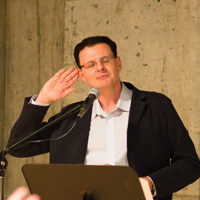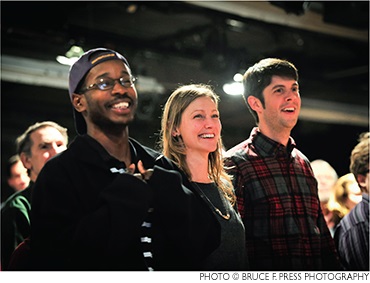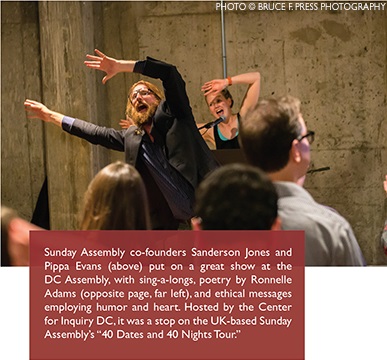An All-Natural Faith
 Bruce F. Press Photography
Bruce F. Press Photography Participating in the first Sunday Assembly in Washington, DC, this past November was a delightful and inspiring experience. My little talk in the midst of the fun and frivolity is adapted here, and I think its humanist message fits well with the guiding ethos set by the founders of the UK-based Sunday Assembly, Sanderson Jones and Pippa Evans. Their motto for a godless congregation? Celebrate life: live better, help often, wonder more.
It’s only natural that people come together in the energizing spirit of shared purpose. When people do so, for a demonstration of what they affirm and what they uphold, let others take notice and pay heed, as worthy ideas and noble sentiments ring out. It doesn’t matter what day we meet, or where we gather, but it does matter why we come together, for mutual inspiration and making a community. It should matter that we feel that we’re on a shared journey together.
It must matter that we think we can make a difference to more than just our personal lives. Thinking big can’t be left to big religions and their big gods. We think that humanity can be good without high gods peering down at us, and without high priests lording over us. We think that we can think for ourselves.
As the saying goes, people who won’t stand up for anything might fall for anything, and people who can’t believe in themselves are people who end up believing in anything. There’s a reason why religions eager to sell their miraculous prophecies and prescriptions have to first paint humanity in drab colors with dark shadows—we are supposed to be fallen creatures, doomed to an underground existence. Once a person’s confidence in their own clear sight gets clouded and darkened by unnatural fears, then shimmering fables can dazzle amazed eyes. Fantasy replaces reality, and the wizards manipulating those fake fantasies can control peoples’ reality. The greatest obstacle to religion, then, is the common sense of the all-natural human mind.
Religions complain that people who won’t be followers can’t believe in anything, but only someone who has already surrendered their mind could imagine that people keeping their wits have lost their way. Yes, we may wander—but those who wander away from religion aren’t lost. We can get lost in wonder without losing our heads. We can be learning from nature without losing our spirit. And we can be listening to reason while leading the way.
It is truly human to try to think, to ponder our situation, and to pass judgment on things concerning us all. We wonder not only about what we are, but also about what we ought to be. We are a species only recently rising to a consciousness of our common humanity. We are so very curious about what will eventually become of us.
To grow into our true potential, we must be prepared to learn—from our trials, our experiments, and our explorations. We may not like what we learn. We may instead want to stay at home and stick to traditional ways; keeping our heads down to look upon familiar ground can make us feel secure and rooted. We feel certain of what we’re doing when we don’t have to do very much. If we think we know exactly why we are here and what we are for, we don’t have to think at all. But this sense of security and certainty is a dangerous trap for humanity.
If we think we surely know our purpose, then we surely lose our purpose to think. Certainty happens when a mind refuses to try to think and fairly judge. Certainty is poison to responsibility. But if purpose is undertaken thoughtfully, a person becomes responsive to realities, and responsible for actions. Taking reality into account is the highest responsibility that any species calling itself intelligent must undertake. It really is time to get real.
 Religious people constantly say that they really know a higher reality and a higher purpose to life. As for us, our good sense tells us that there’s no way that religions could really know such things. We can’t be faulted for asking, “Has religion been leading us towards a hellish place?” Have we been abandoned to a prison where too many people are worried about who’s praying to which god in which heaven, while too few people are minding this earth? We are earthlings, first and foremost. If we can’t support and defend our true homeland—this green and blue planet—then we are indeed homeless and lost forever.
Religious people constantly say that they really know a higher reality and a higher purpose to life. As for us, our good sense tells us that there’s no way that religions could really know such things. We can’t be faulted for asking, “Has religion been leading us towards a hellish place?” Have we been abandoned to a prison where too many people are worried about who’s praying to which god in which heaven, while too few people are minding this earth? We are earthlings, first and foremost. If we can’t support and defend our true homeland—this green and blue planet—then we are indeed homeless and lost forever.
Religious people constantly say that no earthly worldview can support essential human needs, human aspirations, and human ideals. I also hear it said that a human perspective grounded on the cold reality of science could never nourish the vital spirit of morality. Religions keep saying how a worldly perspective reduces life’s value down to the scale of earthly matters and human frailties. They say that nature can never inspire us, guide us, or console us.
I doubt that this is a fair complaint against the natural standpoint. By all means judge human nature harshly. We continue to prove ourselves unworthy of our marvelous habitat, and we’ve hardly lived up to our full natural potential. But judging nature is another matter. And it’s only fair to judge us as a living part of nature. As our knowledge of nature’s secrets has grown, haven’t we been growing right along with it?
Let’s take a fair and proportionate measure of human life. Let’s all stand up together, and by standing up, show how you can stand up for yourself, right here on the ground that you occupy. Stand up straight and let a mark be made to show how tall you can stretch, to a height worthy of a human being. From that height now survey all you can see, everything for which you care, that sphere of what you call your life. Now think about how far we can see when we stand together, and stand on the shoulders of visionary giants who came before us, who taught us and inspired us as they helped humanity grow. Think about how far we have yet to see, and think about how those coming after us will see so much farther, only because we’re bold and proud enough to stand tall ourselves, in our own time.
Thank you for standing with me, for standing for something truly natural and noble. Let’s try to keep that inspiring vision of human empowerment and enlightenment in mind.
A religious perspective tries to lift our eyes even higher from worldly matters up towards eternal infinities. I suspect that straining to see that far only yields optical illusions. Mounting up upon nature’s heights under our own power, I find a tremendous perspective waiting for us that we can actually make sense of. I think that nature can inspire us, guide us, and console us. What would religion tell us that nature cannot?
If the religious spirit has some propositions of worthy wisdom, what would they be? I think they would sound something like this:
- That life is ultimately about a relationship, a connection with what is most supreme.
- That there are two worlds, one seen and one unseen.
- That the unseen world is the supreme world, and it holds the true power and true destiny of all.
- There is something essential in us that can be immortal.
- That what is immortal about us is always what is best in us.
- That what rightly survives from us has the nobility of lasting character, and not the flaws of passing personality.
So might the religious spirit speak if it had a voice. What can our knowledge of nature say on these matters? I think that nature’s perspective tells us this:
- That every life is interrelated, woven and composed of nature’s vibrant cords.
- That the unseen world of nature’s energies shape life and life’s beauties in endless new forms.
- That your essential energy cannot be lost or destroyed, but only recycled with perfect efficiency.
- That there is an afterlife, as consequences of one’s conduct may influence posterity and affect uncountable generations.
- That though our brief spark of consciousness fades out when our body dies, the virtuous part of our character can be woven into the community to come.
- That each person should long consider the shortness of life, and the smallness of self-importance.
I believe that these worldly ways of nature do harmonize with those wise religious sentiments.
 Together they tell us that you are more than you may appear, even to yourself. They tell us that the supreme reality recycles everything, and preserves what is necessary. They tell us that energizing powers are available to help you conduct through yourself what is truly best, on a journey towards the future where everything must go. They tell us that we will all someday be judged for what we think and do, by those after us who must inherit our best along with our worst.
Together they tell us that you are more than you may appear, even to yourself. They tell us that the supreme reality recycles everything, and preserves what is necessary. They tell us that energizing powers are available to help you conduct through yourself what is truly best, on a journey towards the future where everything must go. They tell us that we will all someday be judged for what we think and do, by those after us who must inherit our best along with our worst.
These are humbling messages, but they are also reassuring. Together, they say that you have arrived into the world where you belong, and that you belong to the world that gave you life. That we have no right to hope for a better afterworld until we have made this world better. That no one is entitled to fear death until one has feared to fail at life.
These truly are messages of good sense and noble purpose. We can regard them as the words of an all-natural faith, a truly universal faith—a conviction in what is naturally good within us, a fidelity to what is naturally best about us, and a devotion for a future worthy of us all. If we can confidently trust in our good sense and our shared journey, the farther we will travel, and the more posterity will be reverently grateful for our hard work. And we just might prove worthy of the finest home that we will ever know.
